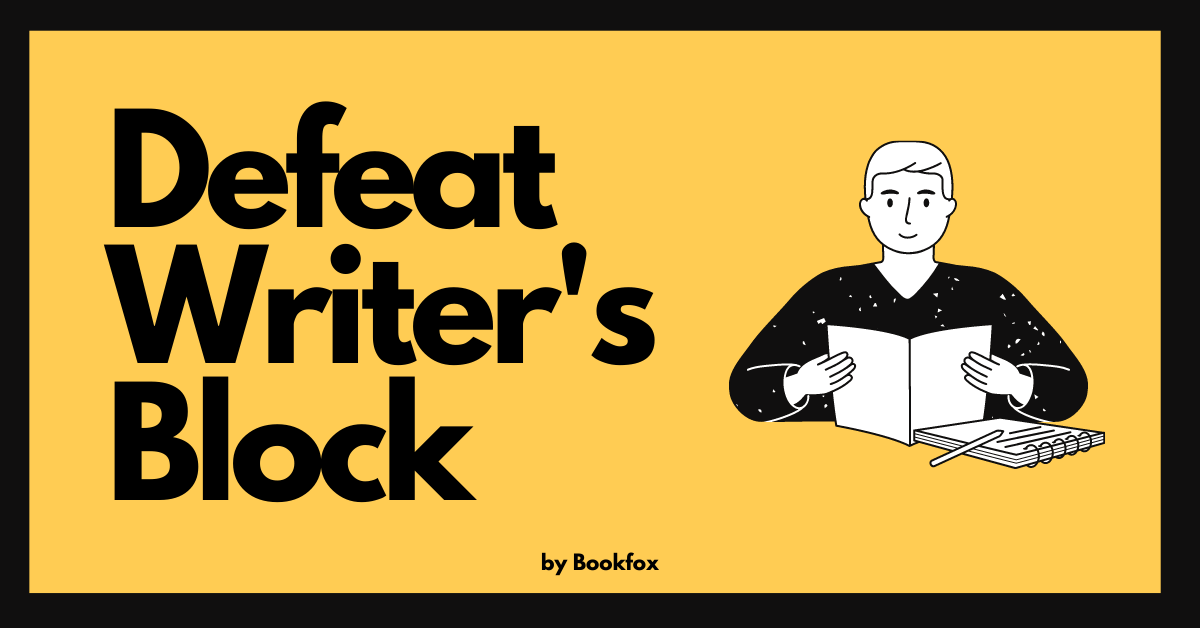 What you’re about to read is unlike anything else on Writer’s Block.
What you’re about to read is unlike anything else on Writer’s Block.
The vast majority of other articles are written by freelancers who pick a few ideas off the top of their heads and slap them into a blog post. Most of them are recycling the same old familiar ideas – take a walk, take a vacation, read a book. Even worse, they’re trying to solve a fundamental problem by surface-level fixes.
It’s stupid and their ideas don’t work.
This post addresses the root reasons of writer’s block. Here’s how to get the most out of it:
- Write down the three most helpful steps in your own language and post them above your writing desk.
- Read this once to get the general idea, and read it a second time to remember it.
- Bookmark it for future reference.
If you want more help with writer’s block, check out my course “Master Your Writing Time,” which will help you with procrastination, writing habits, goal setting, productivity, and defeating your writer’s block.
If you’re more of a visual learner, in this video I offer 5 solutions for writer’s block + what to do about long-term writer’s block.
Before we get started, let’s clear up some common myths about writer’s block.
1. Writer’s block means you’re untalented.
Nope! Great writers and terrible writers all get afflicted with it. It has nothing to do with your skills.
2. If only you had more discipline, you could write.
Commitment or discipline isn’t the issue. People with the worst writer’s block often desire to write more than anyone else.
3. It’s a mental problem.
Not all the time. Writer’s block can often be an emotional problem — trying to please the wrong people or fearing failure.
Okay, with those out of the way, now let’s get started!
1. Practice Boredom
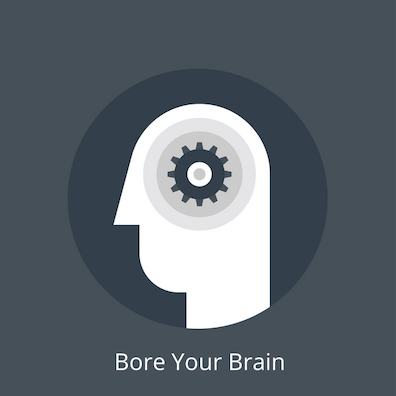 Wired magazine has an incredible article on how boredom is the essential ingredient of creativity.
Wired magazine has an incredible article on how boredom is the essential ingredient of creativity.
So I ask you: when was the last time you sat in a location and didn’t do anything? Had no purpose whatsoever?
Think of the most boring thing you can imagine, and do that for an hour.
Practicing boredom is rebooting your brain. Your brain has been clogged up with too much junk, and you need to wipe it all clean with a nice reboot.
Let me give you some examples.
- Sit on your back porch and watch the squirrels.
- Drive to a local airport and watch the planes take off.
- Watch cars passing.
Our culture has a sickness, and that sickness is constant entertainment. Think about it: remember all the boredom in your childhood? Now how often are you bored? That lack of boredom is a poison pill for your creativity.
2. Avoid Perfectionism
 At the top of your page, simply write: This Is Trash That No One Will See.
At the top of your page, simply write: This Is Trash That No One Will See.
Now you’re free. Now you can write anything you want to and it doesn’t matter.
See, when I struggle to write the perfect sentence, I don’t get anywhere. I’m too determined to be perfect that I don’t let myself do something that’s just adequate. But the adequate writing always comes before the excellent writing.
As Anne Lamott said, you often should accept your first draft is going to be terrible and just get it down on the page.
That means:
- Writing quickly (freewriting, as fast as possible)
- Not pausing to edit yourself
- Silencing the inner critic
3. Know Less
 The author Dylan Landis said, “You need to know less to find your way back into the dark.”
The author Dylan Landis said, “You need to know less to find your way back into the dark.”
Maybe you have writer’s block because you know too much about your story. There are too many plotlines, too many characters, too much outlining. Let it all go. Go back into the dark, when you knew nothing about your story, when you were exploring a vast cave with just a candle held in front of you.
That lack of knowledge, paradoxically, sets you free.
Sometimes the only way to know less is to start a new project. Other times, it’s by killing off a character or a plotline, so that the whole balance of your project is thrown out of whack.
Be an explorer of the world. Know less about your story, and it might catalyze your imagination.
Buddhists call this “Beginner’s Mind.” You can’t write a story when you know everything. Act as if you don’t know anything, as if this is the very first story you’ve ever written, and that mind of a beginner will help you create.
4. Midwife A Friend’s Story
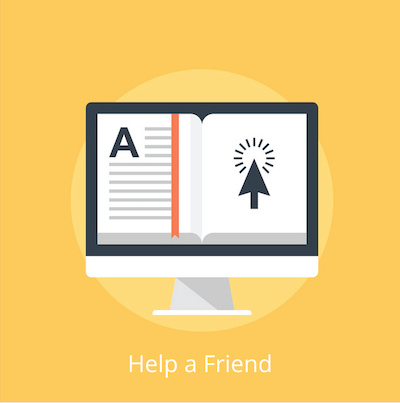 Lots of writer’s block articles suggest that you read to rehab your writer’s block. But I’ve found this doesn’t work as well as giving feedback on your friend’s story.
Lots of writer’s block articles suggest that you read to rehab your writer’s block. But I’ve found this doesn’t work as well as giving feedback on your friend’s story.
Let me explain. I used to be a developmental editor, meaning I gave advice and feedback to writers. I worked full time as an editor for six years, and part time for four years before that. (if you’d like editing, I do have editors here at Bookfox).
Editing slows me down in a productive way, forcing me to read carefully and truly consider what I’m reading. And that slowness ends up giving me ideas for my own fiction.
But you say, “Can’t I just read a book?”
Well, no. Reading a book happens too quickly, and often you’re not engaging with the material deeply enough, thinking about the underlying scaffolding of the story.
If you’re stuck, don’t waste time wallowing in your inaction. Find a friend and offer to give feedback on their story. By talking about someone else’s story, it’ll rattle the gears of creativity in your own brain.
5. Seek Creativity Outside Writing
![]() Maybe you’re blocked because you’re simply trying … too hard to write? (it’s counter-intuitive, I know).
Maybe you’re blocked because you’re simply trying … too hard to write? (it’s counter-intuitive, I know).
Sometimes the best way to break through a blockade is to stop trying so hard to circumvent the blockade and just go around it!
Bookfox has a post of 20 excellent things to do that provide the cure for writer’s block, with ideas like:
- watching a play
- taking a bubble bath
- discussing your writing with a friend
Using nature as inspiration, as everyone from Thoreau to Nietzsche has done, is also a good idea. When I spent time living in the Swiss Alps near Lake Geneva, every morning I would wake up and stare at those glorious mountains and feel awestruck and humbled.
You have to live life, to truly live it as an adventure, before you can write. So fill up your reservoirs of creativity by looking for it outside the page.
6. Freewrite Using Visual Prompts
 Forget those old, stale, word-based prompts: a man and a woman are fighting in a room — Go!
Forget those old, stale, word-based prompts: a man and a woman are fighting in a room — Go!
If you’re truly experiencing writing block, you might be a little jaded and tired of that sort of textual writing exercise.
Let’s change it up a little and focus on using visual inspiration.
Check out this year’s worth of visual writing prompts — three photos that you have to incorporate into the same story.
This is a bit silly, but once upon a time I came up with Emoji writing prompts. The best thing to do is to pick a single number at random, and then attempt to write a story based on that set of emojis.
Or if those visuals aren’t working out for you, I also have some musical writing prompts — listen to a song on repeat while writing the prompt.
7. Deprive Your Senses
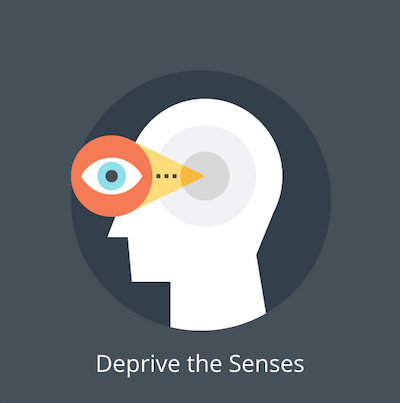 Long-term sensory deprivation is used as torture. I do not recommend this.
Long-term sensory deprivation is used as torture. I do not recommend this.
Short-term sensory deprivation, though, is used for meditation and can have enormous creative benefits. Even Forbes magazine wrote about how sensory deprivation tanks improve creativity.
The goal of sensory deprivation is to cut yourself off from the world in order to set the mind free.
Let’s consider some possible deprivations:
- Sound. Now most people I know write with music. And if that’s working for you, then wonderful. If you’re struggling, though, try writing in absolute silence. When attempting sensory deprivation, I wear earplugs to block out even the ambient noise.
- Sight. Have you ever tried to write blindfolded? It frees you from concentrating on the computer screen. You don’t have to worry about editing because you can’t edit. If you don’t blindfold yourself, make sure the room is pitch dark.
- Taste. Stop eating during writing. Even more importantly, stop drinking. No more coffee or tea or soda or whisky while writing. Medically speaking, digestion draws blood from the brain to the stomach. That’s why you get sleepy after a big meal. Keep all the blood and energy in your brain, where it can fuel your writing.
- Touch. Wear loose clothing. Make sure your desk is ergonomic. Make sure the temperature is neither hot nor cold. Nothing should exist outside your writing.
8. Give Yourself Obstructions
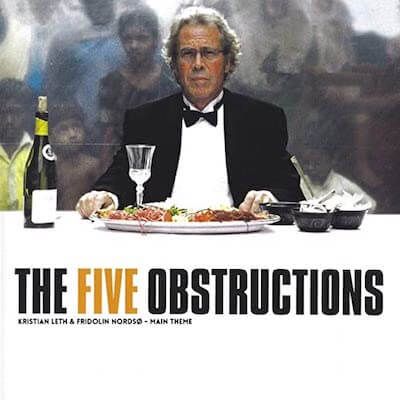 There was a Danish documentary film called the 5 Obstructions, in which a filmmaker challenged another filmmaker to remake his classic 20-minute film 5 times. For each remake the first filmmaker would give him an “obstruction,” such as:
There was a Danish documentary film called the 5 Obstructions, in which a filmmaker challenged another filmmaker to remake his classic 20-minute film 5 times. For each remake the first filmmaker would give him an “obstruction,” such as:
- Shoot it without any frame lasting longer than half a second.
- Shoot it without a budget.
- Shoot it as a cartoon.
Until finally, for one version he gave him no obstruction at all.
Out of the remakes, can you guess which one was weakest?
That’s right. The one without any obstructions.
All of those obstructions only appeared to hinder him, while in fact they freed him to create amazing art. Obstructions force us to be creative.
Try these writing obstructions:
- Write a novel or story where only 3 characters are seen or mentioned. This has sometimes been called an “unpeopled novel.”
- If you know a second language, write in a language that is not your mother tongue.
- Instead of typing, speak your story. Write with a speech dictating program. Try Dictation, Speechnotes, and Dragon NaturallySpeaking.
- Write a story in a country you’ve never been before.
- Write at a time of day you’ve never written before.
- Write down a list of 5 words that you use too often. Now write without using them at all.
9. Ditch Initial Ideas
 Many writers hit writer’s block because they choose their first or second or third idea. And that idea is NOT the best one to choose.
Many writers hit writer’s block because they choose their first or second or third idea. And that idea is NOT the best one to choose.
Writers often need to come up with 50 ideas and then choose the best one to pursue.
How do you come up with a fantastic idea, rather than just a good idea?
Here’s an exercise I’ve done several times to write posts for Bookfox, and it’s always helped me with writer’s block:
- Come up with 100 novel ideas in a single day. That’s right — 100 fully formed plots, summarized in two- or three-sentence pitches. It’s difficult, but you would be surprised at how many ideas you can get just from looking at things in your house.
- Then pick one and one alone that is your best one, and write that.
10. Rewrite your Emotions
 You’re probably bummed that you can’t write. And strangely enough, that kind of sadness might also prevent you from writing. And that lack of writing makes you even more depressed.
You’re probably bummed that you can’t write. And strangely enough, that kind of sadness might also prevent you from writing. And that lack of writing makes you even more depressed.
You need to break free of the vicious cycle and rewrite your emotions. Tony Robbins actually has some great lessons about how to transform your mindset, but I’ll give advice specific to writers below.
First Step: imagine the happiest time in your writing life. Now write down all the conditions in your life that created that amazing writing time.
- Was it a certain job or employment?
- Was it sleep patterns or exercise?
- Was it a habit or discipline?
Think about what you need to do to recreate that perfect writing laboratory.
Second Step: let’s think of the future. Think of where you want to be as a writer, what wonderful rewards you want to reap.
- Big awards?
- Great reviews?
- The bestseller lists?
- A 7-figure advance?
Meditate on what you want. Imagine that scenario in your life, how it would change how you think about yourself, how it would your life and how others perceive you. Think about how happy you will be when you get that.
Now channel that happiness into your writing. Let it fuel your writing. Chase that goal.
11. Artificially Limit your Writing Time
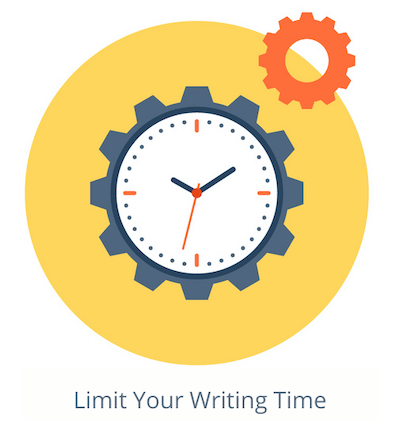 Ethan Canin was having trouble with writing and procrastination. So he decided to limit the amount of time he allowed himself to write.
Ethan Canin was having trouble with writing and procrastination. So he decided to limit the amount of time he allowed himself to write.
He set an alarm clock and only let himself type for thirty minutes.
No matter how well the writing was going, when that timer dinged, he removed his hands from the keyboard.
You’d think he wrote less than when he was spending several hours writing — but you’d be wrong. The former Iowa MFA professor said he was much more productive within that 30 minute window.
Someone the pressure of only having thirty minutes to write made his fingers fly over the keyboard.
By forcing yourself to think of time as a rare commodity, you will force yourself to efficiently use your writing time.
Action step: buy a timer, put it next to your desk, and write like a madman.
12. Go Small
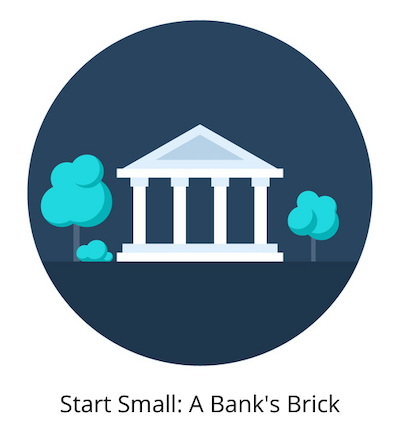 Once a young writer had terrible writer’s block. So an experienced older writer told him, “You should write about the town.”
Once a young writer had terrible writer’s block. So an experienced older writer told him, “You should write about the town.”
The next morning, the young writer sat in front of his computer for hours without writing anything. He told the older writer it hadn’t worked.
“So write about the bank,” said the older writer.
The younger writer tried to write about a bank robbery, but it didn’t work. He told the older writer that failed too.
“Try one last thing,” the older writer said. “Go to the bank and write about the third brick from the left from the main doors, at bellybutton level.”
The younger writer thought it was stupid, but agreed to try. The next morning he looked at the bank’s third brick. He noticed a corner had chipped off, due to its age, and that two small holes had been bored through it. In the holes were tiny pebbles like insect eggs. He’d never really focused on the color of bricks, either, and discovered them not to be red, but the color of a burnt sunset.
He sat on a bench across the street and wrote about the construction worker who built the first bank in the 1920s, and the color of brick dust on his hands, and his overalls with a stain near the pocket, and the way he loved picnicking with his wife near the river, and how they struggled to have a child.
He went back to the older writer and told him that it had worked! The brick had told him the story.
The older writer smiled. “You write big things by focusing small.”
How difficult it is to write about a single brick! We always want to start big, with a universe, with grand meaning. But resist this temptation. Limit yourself with a small focus. You will find that the smallest thing mushrooms into the entirety of a universe.
13. Crowd-Write
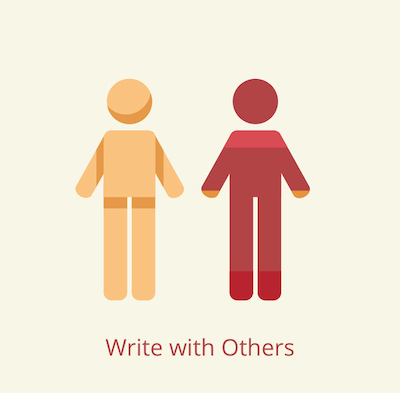 Even if you’re an introvert, it’s important to collaborate with others, and to feed off their creative energy. Find a group of writers where you can sit in the same room together and write.
Even if you’re an introvert, it’s important to collaborate with others, and to feed off their creative energy. Find a group of writers where you can sit in the same room together and write.
Why do you think NaNoWriMo has been so popular? Even if you aren’t “with” other people in the same room, you’re getting energy from all the people attempting to write 1667 words a day.
For instance, I’ve been part of a writing group called “The Biscuits” for almost a decade. We take regular writing retreats together.
Five or six of us will escape to a house in Oregon or Temecula and spend three days writing together. Every flat surface and lap in the house is filled with a laptop and a frantic expenditure of energy upon the keyboard. We take breaks every few hours to get snacks, prepare a meal, take a swim, or talk through a writing problem with each other.
When I’m with them, I do my best writing.
14. Accept Writer’s Block
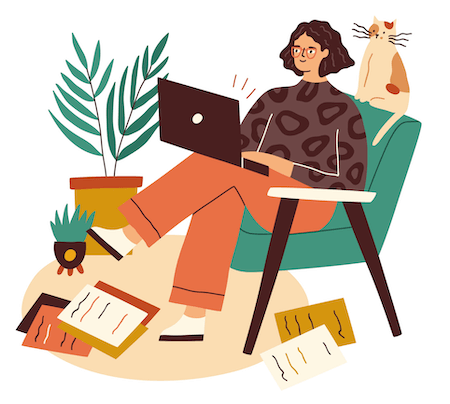 What? Didn’t I just spend the whole post telling you how to defeat writer’s block? And now you’re supposed to just accept it?
What? Didn’t I just spend the whole post telling you how to defeat writer’s block? And now you’re supposed to just accept it?
Well, sometimes, yes.
You are not a machine. If you expect to write all the time, you are thinking of yourself as a machine rather than as a human being.
Human beings have ups and down, ebbs and flows in creative energy. Erik Larson said, “Often after I finish a book, I enter the dark country of no ideas.”
It’s terrifying to be in that dark country. But it’s also natural and good.
Accept fallow periods in your life. Think of yourself like a farmer, who has to let a field go fallow in order to get a bigger harvest the next year. Let your brain lie fallow and regenerate all its energy.
Sometimes a block can be a message:
- Are you going in the wrong direction?
- Should you be writing something else?
- Should you change tack in your novel?
Remember that even when we’re not writing, we’re still writing. We’re still:
- hearing stories
- noticing details
- learning about psychology
Above all, treat yourself gently. You’re not superhuman. You’re just trying to do the best you can as a writer. Remember to love yourself and not constantly harp on yourself. As a writer, you can be your own worst critic. Let go of that critical voice and give yourself a big hug.
People tend to overestimate what they can do in a year, and underestimate what they can do in 30 years. You have a lot of time ahead of you, and you will accomplish great things as a writer.
Bonus Ideas on Overcoming Writer’s Block:
![]() 15. Create a one-day ban on social media to allow your brain to regenerate
15. Create a one-day ban on social media to allow your brain to regenerate
The constant dopamine hits of social media can numb our brain, and reduce our power to be creative. Try a fast from whatever media you love most — it could be television, video games, or social media.
16. Email a Friend and Confess Your Writer’s Block
We normally think about “confession” as having spiritual connotations, but being vulnerable has huge psychological benefits for artists. Think of Brene Brown and her famous TED talk on vulnerability. Perhaps if you tell a writing friend how you’re stuck, just the act of verbalizing it will help get you past the hump.
17. Take steps to reduce stress and anxiety (which are huge creativity killers)
Maybe you’re super stressed at work, or your family situation is creating a huge amount of anxiety. What can you do to open up space in your life that’s free from those pressures?
18. Write to a different audience
We are always writing to fit the expectations of someone. Perhaps you’re writing to the wrong group — former teachers or professors, or an imaginary critic. That kind of pressure can hamstring your writing. Try writing to a friend, or a parent, or a favorite Aunt or Uncle. Try writing to an imaginary person who loves every single word you’ve ever written.
Sometimes you need a shot in the arm of having someone inspire you with examples, stories, and direction. That’s what I do in my creative writing courses here at Bookfox.
20. Write a Different Genre
Blow off some steam and write some silly fan fiction, or try some steamy romance scenes. Try to write on-the-streets low brow or highfalutin high brow. Try writing a historical piece with people talking like they’re from Brooklyn, or write some cli-fi (sci-fi concerned with climate change — what did you think it was?).
21. Go Exercise
It’s proven that exercise gives you massive dumps of dopamine, which is the type of brain chemical that helps you with creativity. It doesn’t have to be strenuous exercise — a long walk, or light weightlifting will work just as well as a run or biking.
22. Invert Your Work in Progress
Sometimes, when you hit a creative block, it’s because there is something fundamentally wrong with your book, not with yourself. So invert what you’re writing. If you have a scene where someone is attacking someone else, reverse the roles. If you have a scene with an accusation, have another character deliver it. Tell a scene through a different point of view.
23. Hire a Developmental Editor
I’m not talking about the punctuation and grammar Nazis. They won’t help you. I’m talking about a story editor, someone who writes a whole essay about your book, talking about what you’re doing well and where you can improve. Sometimes the insight of a professional can unblock you and give you the right course forward.
24. Dramatize Your Scene
Fiction writers have characters and dialogue. So stand up and enact it. Do the motions. Say the lines. If you embody the words in your body, it’s a powerful way of breaking through the linguistic barrier of your brain. It’s a way of cross-pollinating your creativity.
25. Take Stimulants
Of course I’m talking about coffee. What other stimulants would I be talking about? Of course I wouldn’t recommend anything else, nothing prescription or illegal, of course not. That would be so irresponsible of me. But if you do … experiment, let me know how it goes.
25 Quotes about Writer’s Block
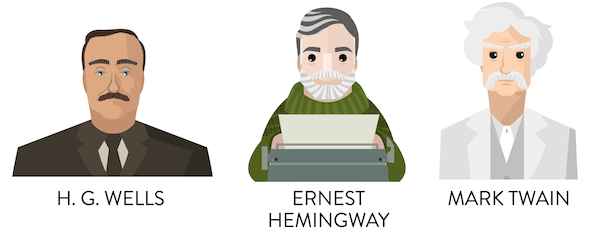
- “If you are in difficulties with a book, try the element of surprise: attack it at an hour when it isn’t expecting it.” – H. G. Wells
- “The best way is always to stop when you are going good and when you know what will happen next. If you do that every day … you will never be stuck.” – Ernest Hemingway
- “The secret of getting ahead is getting started. The secret of getting started is breaking your complex overwhelming tasks into small manageable tasks, and then starting on the first one.” – Mark Twain
- “And if you’ve got a writer’s block, you can cure it this evening by stopping whatever you’re writing and doing something else. You picked the wrong subject.” – Ray Bradbury
- “The best thing is to write anything, anything at all that comes into your head, until gradually there is a calm and creative day.” – Stephen Spender
- “When I sit down in order to write, sometimes it’s there; sometimes it’s not. But that doesn’t bother me anymore. It’s blocked because it ought to be blocked, because you haven’t got it right now.” – Toni Morrison
- “I deal with writer’s block by lowering my expectations. I think the trouble starts when you sit down to write and imagine that you will achieve something magical and magnificent — and when you don’t, panic sets in.” – Malcolm Gladwell
- “If you get stuck, get away from your desk. Take a walk, take a bath, go to sleep, make a pie, draw, listen to music, meditate, exercise; whatever you do, don’t just stick there scowling at the problem.” – Hilary Mantel
- “Writers are less interesting than they think. Fortunately, the rest of the world is more interesting. Interview people. Look at things. Don’t just sit at the computer.” – Jeffrey Toobin
- “I don’t think that writer’s block exists. I think that when you’re trying to do something prematurely, it just won’t come. Certain subjects just need time.” – Joyce Carol Oates
- “My prescription for writer’s block: write badly. Bad writing is easier. And it must be popular, there’s so much of it.” – P.J. O’Rourke
- “I learned to produce whether I wanted to or not. It would be easy to say oh, I have writer’s block, oh, I have to wait for my muse. I don’t. Chain that muse to your desk and get the job done.” – Barbara Kingsolver
- “The best advice on writing I’ve received was from John Steinbeck, who suggested that to get around writer’s block, pretend to write to an aunt or a girl friend.” – George Plimpton
- “I heard some writer say that his father was a truck driver, and you know what, never in his life did that man get truck driver’s block.” – Barnaby Conrad
- “It would be wisest not to worry too much about the sterile periods. They ventilate the subject and instill into it the reality of daily life.” – Andre Gide
- “Prescription for Writer’s Block: Begin (with a pen, not a machine).” – Cynthia Ozick
- “Writer’s block is my unconscious mind telling me that something I’ve just written is either unbelievable or unimportant to me, and I solve it by going back and reinventing some part of what I’ve already written so that when I write it again, it is believable and interesting to me.” – Orson Scott Card
- “Writer’s block is a condition that affects amateurs and people who aren’t serious about writing. So is the opposite, namely inspiration, which amateurs are also very fond of. Putting it another way: a professional writer is someone who writes just as well when they’re not inspired as when they are.” – Philip Pullman
- There are times when the words won’t come. When I feel dried-up I deal myself a few games of solitaire at my desk. I’ve been doing it all my life. Sometimes I play 10 or twenty games, sometimes 40. Once, I played for three straight days. The important thing is not to leave the work place.” – Richard Condon
- “When you face writer’s block, just lower your standards and keep going.” – Sandra Tsing Loh
- “Do you ever go into the bathroom and sit on the toilet when you don’t need to take a shit? Do you ever just sit there completely empty and sit there and push? No, you don’t. You go eat something and then you live your life and what happens, happens. It’s the same thing with writing. If I don’t have an idea that I’m not absolutely terrified of losing, then I don’t bother to write.” – Chuck Palahniuk
- “I haven’t had writer’s block. I think it’s because my process involves writing very badly.” –
- “Give yourself permission to write a bad book. Writer’s block is another name for writer’s dread—the paralyzing fear that our work won’t measure up.” – Barbara Kingsolver
- “You can’t wait for inspiration. You have to go after it with a club.” – Jack London
- “I don’t sit around waiting for passion to strike me. I keep working steadily, because I believe it is our privilege as humans to keep making things. Most of all, I keep working because I trust that creativity is always trying to find me, even when I have lost sight of it.” ― Elizabeth Gilbert
Bonus Creativity Tips:
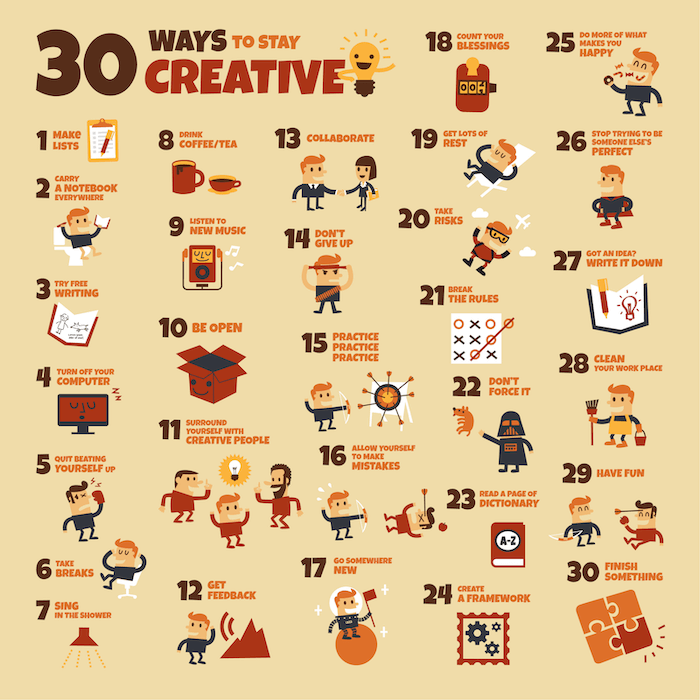
RECAP: The Steps to Defeating Writer’s Block
- Practice Boredom. Don’t fill your life with endless entertainment. Put your phone away. Turn off your internet. Let your mind empty, and re-cultivate your imagination.
- Avoid Perfectionism. Perfection is the enemy of the blank page. You have to be okay with a messy first draft.
- Know Less. If you’re stuck, wipe away everything you know about a story. Start with a new story, and don’t plan anything. Let it unfold naturally.
- Midwife a Story. Help a friend publish. Give good feedback, close line edits and great macro advice. You love it when people do it for you; do it for them.
- Seek Creativity Outside Writing. Go to a musuem, watch a play, take a long hike. Find inspiration outside the screen.
- Freewrite Using Visual Prompts. Try getting visual inspiration for your writing.
- Deprive Your Senses. Wear a blindfold. Push in some earplugs. Drop the drapes. Wear loose clothing. Eliminate all sensory input so that the story is all that exists.
- Give Yourself Obstructions. Create obstructions for your writing, focus on small things rather than large things, and learn to train your attention.
- Ditch Initial Ideas. Maybe you’re writing the wrong story or the wrong book. Generate hundreds of ideas so you can focus on the best one.
- Rewrite your Emotions. Focus on two things: capture the feelings of when you’ve been most productive in the past, and focus on what you’re going to achieve in the future.
- Limit Your Writing Time. Write for only 30 minutes or 1 hour a day, and push yourself during that window of time.
- Go Small. Instead of focusing on big ideas and big stories, focus on the tiniest, smallest thing imaginable. Start there.
- Crowd-Write. Write with other people. Writing with other people fuels you. Get a writing partner. Push each other.
- Accept Writer’s Block. You are not a machine. Do not expect you will write like one. Your mechanistic writing would be terrible, anyways. Accept the cyclical nature of writing and try to learn from this episode of writer’s block.
